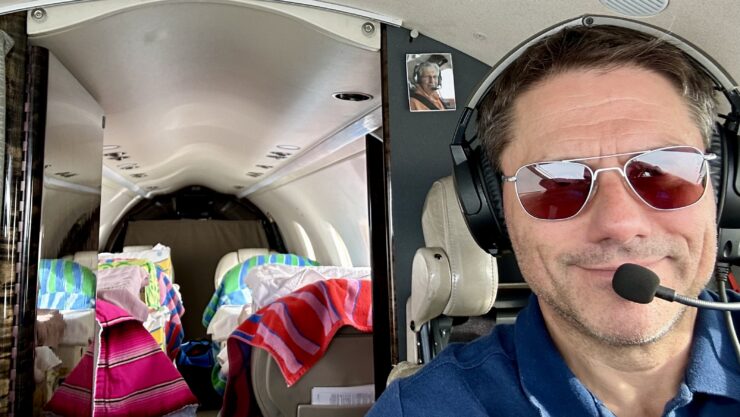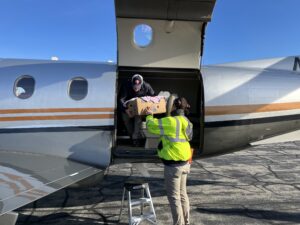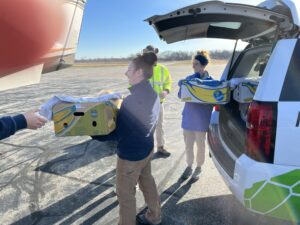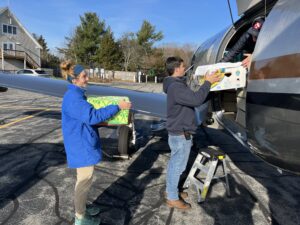Volunteer pilot transports rescued sea turtles from Marshfield Airport

Turtles fly too. They really do. Lucky turtles do, anyway. The lucky ones fly to safe, warm climes for the wintertime. But they do that with a lot of help from their friends.
What causes volunteer pilots like Steve Bernstein to step up is this: Sea turtles travel south to warmer water when the water they live in in the northeast all summer starts getting cold. But look at a map of Cape Cod and see how the lower Cape hooks up like a flexed arm with ragged catchalls. Turtles heading south in Cape Cod Bay get stuck there. They become what Senior Biologist Linda Lory, manager of the New England Aquarium’s Rescue and Rehabilitation Department, calls cold stunned.
“Turtles in summertime come into the Bay, and they’ll forage on all the prey, and then around October, November the water temperatures start dipping,” Linda explained as she and her team were about to unload 35 turtles at Marshfield Municipal Airport on the first day of December for Steve to fly to North Carolina for their next round of rehabilitation before being released into warm water.
“And, so, what they’ll do is they’ll have the signal to start swimming south. They swim south and hit a hook, a hook within a hook, and they get caught. Then it’s too cold for them to go anywhere and they get stuck. Their temperatures drop; they’re reptiles and are cold blooded so they get very cold, become hypothermic, debilitated, and they start floating on the surface of the water. And then with the onshore winds we will start seeing turtles wash in and become stranded. They will wash in in the hundreds sometimes.”

Shoreline Aviation’s Airport Assistant Manager Ben Garman hands off a carton of turtles to pilot Steve Bernstein. Photo/Shoreline Aviation
This day’s assignment
Linda and her associates, Emilie Davis, also of NEAQ, and volunteer Helena Robinson, who works in an aquarium in England, are handing off 35 sea turtles to Steve Bernstein this day – 24 endangered Kemp’s Ridley turtles along with others, including green sea turtles.
“This is really a group effort between lots of organizations,” Linda said, including NOAA. Steve is associated with one of those organizations.
“I’m a volunteer pilot with an organization called Turtles Fly Too that was put together eight or ten years ago,” he explained while waiting for the NEAQ van to arrive with its precious cargo. “There is a turtle rescue and rehabilitation community for expeditious transport of endangered sea turtles that strand here in Cape Cod Bay. I was connected with the group sort of by happenstance, just through the pretty tightknit general aviation community, and was hooked from the start. My family and I flew our first volunteer mission, I think it was 2015, and I’ve tried to stay somewhat active each year since.”

New England Aquarium staff Linda Lory, left, and Emilie Davis transfer rehabbed sea turtles to the plane that will take them to North Carolina. Photo/Shoreline Aviation
Shoreline Aviation an old hand at turtle transfers
And volunteer pilots and turtle rescuers do stay active. Depending on the year, Marshfield could be the site of a dozen or even dozens of turtle handoffs. Shoreline Aviation, Inc., which manages the airport, has been involved in turtle transfers for years.
“These pilots who transport the turtles do it as volunteers,” Shoreline’s Airport Assistant Manager Ben Garman explained as Steve’s Pilatus flew overhead to prepare for landing. “They contribute their plane, their time. They do fuel up the aircraft here at the airport, although they get a charitable discount from Shoreline; that’s the only fee they pay is for fuel. There’s no other fees, like ramp or tiedown fees.”
Ben – whose line team happily assisted in loading the reptilian cargo into the aircraft – said turtles will be transported from the cold winter here through the winter months down to the Carolinas, Georgia, Florida. “And that will take place pretty much through the winter. We don’t know how many trips there will be, but there could easily be a dozen or there could be a few dozen.”
Linda says that the Aquarium can see 50 to 60 turtles coming in to their rehab facility daily.
“We partner with Wellfleet Bay, Massachusetts, Audubon, down on the Cape,” she said. “They have a whole network of volunteers and staff that will go out throughout the day, and they will find these stranded sea turtles that have been washed ashore this time of year, and then they will drive them up to our facility at New England Aquarium, and that’s where we take over the medical management, the husbandry, and all the live guys we try to get back to health.”
This day’s turtles arrived at NEAQ a couple of weeks ago cold stunned, “so very, very cold and debilitated,” Linda said. “Other organizations across the country help in this effort, where we’re kind of like the emergency center, where New England Aquarium will bring in the turtles, we will stabilize them, and then we will then help transport them out to other rehab facilities.”

Shoreline Aviation’s Chris Davis and New England Aquarium’s Emilie Davis hand sea turtles to volunteer pilot Steve Bernstein. Photo/Shoreline Aviation
Home for dinner
Linda calls Turtles Fly Too, “a great organization that assists in helping get the pilots that we need to help fly these turtles to various destinations.”
Steve shares her opinion.
“I got the call a few days ago that a few dozen turtles had to head down the coast, having been rescued by volunteers along the shores of Cape Cod and rehabilitated and determined to be ambulatory, so that we could transport them here in the Pilatus PC-12 my company operates, which is well suited for the mission because it’s pressurized,” Steve said.
“We can get down to North Carolina in a couple of hours and minimize the trauma to the turtles as they’re transported down for further rehabilitation before they’re released this spring, someplace along the southeast coast, to be determined by the protocols that apply. There’s quite a bit of regulation and strict adherence required to some federal guidelines for when, how and where the endangered sea turtles can be released.”
It’s all in a day’s jaunt for Steve, who lives and works in northern New Jersey.
“The airplane’s based at an airport called Caldwell in Essex County, New Jersey. So, I hopped up here in Marshfield, and we’ll deliver the turtles to Beaufort, North Carolina, and then I’ll return to base. Home for dinner, I like to say.”
Lead photo: Volunteer pilot Steve Bernstein flies his precious cargo to Beaufort, North Carolina, for further rehabilitation. Photo courtesy of Steve Bernstein
Back to News